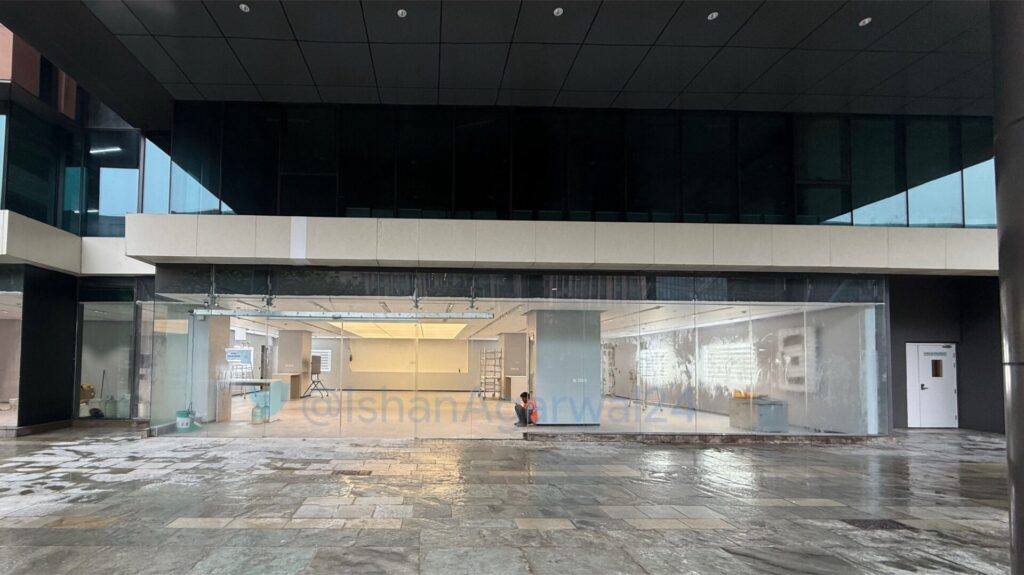Tesla is making waves in India with the upcoming opening of its second showroom in the country, this time in the bustling Aerocity district of Delhi near the IGI Airport. The news was first shared by Indian tech and EV enthusiast Ishan Agarwal, who posted an image of the under-construction showroom on X.
The Delhi showroom comes hot on the heels of Tesla’s first-ever Experience Center in India, which recently opened in Mumbai. This launch marked the beginning of Tesla’s long-awaited operations in the country, with the Model Y being the first vehicle offered to Indian customers.
At present, Tesla is offering the Model Y in two Rear-Wheel Drive (RWD) variants in India, but more trims and models are expected to become available as the company expands its presence. However, the pricing in India is currently inflated due to steep import taxes ranging between 70% and 100%. Tesla is in discussions with the Indian government to secure a reduction in these duties, aiming for a tax rate closer to 10% to make its offerings more competitively priced in the Indian market.
The Aerocity showroom will be one of several planned Tesla Experience Centers across India, as the company has ambitious plans for the region. These plans include opening a service and warehouse center in Kurla West, in addition to its existing Pune-based engineering hub and Bengaluru corporate office. Furthermore, Tesla plans to deploy Superchargers and destination chargers across key urban centers to support its growing customer base.
The opening of the Delhi showroom underscores Tesla’s commitment to aggressively scaling in India, one of the world’s largest automotive markets. With the Model Y leading the charge, Tesla is poised to make a significant impact on the Indian EV market.
In addition to the showroom news, Tesla recently hit a major milestone by producing its 1,000th Megapack at its Shanghai Megafactory. The company’s energy products business is rapidly expanding, showcasing Tesla’s commitment to sustainability and innovation. Tesla’s refreshed Model Y also earned top marks for safety, receiving the 2025 Top Safety Pick+ award from the U.S.-based Insurance Institute for Highway Safety (IIHS).
Another notable project is the 400 MWh Tesla Megapack installation near Las Vegas, featuring a solar and battery energy storage system developed by Estuary Power. This project highlights Tesla’s efforts to revolutionize the energy industry with sustainable solutions.
Overall, Tesla’s expansion in India and its continued success globally demonstrate the company’s leadership in the EV and energy sectors. With innovative products, strategic partnerships, and a commitment to sustainability, Tesla is shaping the future of transportation and energy worldwide. The world of technology is constantly evolving, with new advancements and innovations being made every day. One of the most exciting developments in recent years is the rise of artificial intelligence (AI) and machine learning.
AI and machine learning have the potential to revolutionize industries across the board, from healthcare to finance to transportation. These technologies are already being used in a variety of ways, from self-driving cars to virtual assistants like Siri and Alexa.
But what exactly is AI and machine learning, and how do they work? AI refers to the simulation of human intelligence in machines that are programmed to think and learn like humans. Machine learning is a subset of AI that allows machines to learn from data and improve their performance over time without being explicitly programmed.
One of the key advantages of AI and machine learning is their ability to analyze and process vast amounts of data quickly and accurately. This can help businesses make more informed decisions, improve efficiency, and even discover new insights that would be impossible for humans to uncover on their own.
In the healthcare industry, AI and machine learning are being used to analyze medical images, predict patient outcomes, and even assist in surgeries. In finance, these technologies are being used to detect fraudulent transactions, automate trading strategies, and improve customer service.
In transportation, AI and machine learning are powering self-driving cars, optimizing traffic flow, and improving the efficiency of logistics operations. These technologies have the potential to revolutionize how we move people and goods around the world.
Despite the many benefits of AI and machine learning, there are also challenges and concerns to consider. One of the biggest concerns is the potential impact on jobs, as these technologies have the potential to automate many tasks that are currently performed by humans.
There are also ethical considerations to keep in mind, such as bias in AI algorithms and the potential for misuse of these technologies. As AI and machine learning continue to advance, it will be important for businesses and policymakers to address these issues and ensure that these technologies are used responsibly.
Overall, the rise of AI and machine learning represents an exciting new frontier in technology. With the potential to transform industries and improve our daily lives, these technologies are sure to play a key role in shaping the future of our world.

